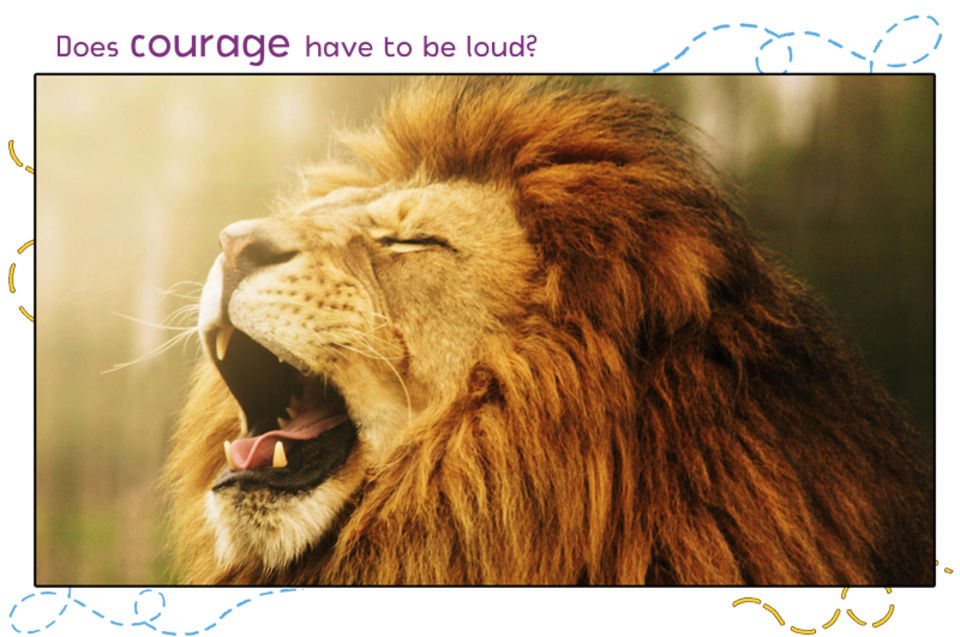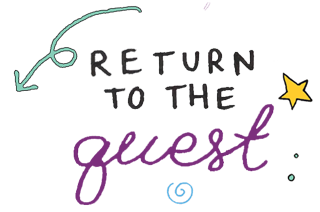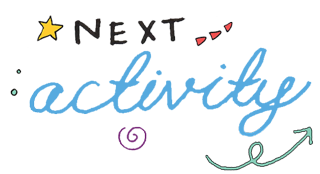
Roar of courage
| Objective: To wake up your creative and thinking energy by making a courageous roar! |
Duration: 1 to 15 minutes
Material:
- Your body and mind
- Space to move
Instructions:
Hercules is a hero of Greek mythology known for his strength and courage. Among his glorious adventures and legendary achievements are twelve awe-inspiring feats that he accomplished even though they seemed impossible! For the first of his twelve feats, Hercules defeated the lion of Nemea, whose roars terrorized the inhabitants of the region...
...
- Invent the roar. Your mission is to invent the roar of courage to roar even louder than the terrifying lion of Nemea! First think of a sound that could represent courage. Would it be soothing, soft and reassuring... or deafening, shrill and frightening?
- Roar your roar. Then take a courageous pose, fill your lungs with air, and roar with all your might! You can even add movements to roar with your whole body!
- Think about your experience. After sending vibrations roaring through your vocal cords—and maybe even the entire house!—you may wonder whether courage has to be loud... Does it have to be heard to exist? Can you be courageous in silence? Can speaking up and keeping quiet both be courageous acts? Why or why not?
...
Bonus: For the fifth of his twelve feats, Hercules cleaned Augeas' stables in a single day—something that had never been done before! In like spirit, your mission is to clean an area of your house that is in great need of cleaning... perhaps your bedroom or the bathroom? But wait... do courageous heroes clean? Do you have to be courageous to take care of your space or the space of others? Think about members of your family who do the household chores, people who clean hospitals, garbage collectors, activists who clean up the oceans... are these people courageous? Why or why not? |
Bonus plus: Achilles is another courageous hero from Greek mythology. When he was born, his mother Thetis dipped him in the waters of the river Styx, which are known to make any part of the body immersed in them invulnerable. However, while she immersed the child in the river, she held him by the heel. His heel thus became Achilles' weak point. Even today, the expression "Achilles' heel" still refers to a person's vulnerable point. Do you think everyone has an "Achilles' heel"... even the most courageous people? Should we try not to have any vulnerable points? Do you have to be invulnerable to be courageous? Or maybe it’s being vulnerable that takes courage... |

| Tricks for tots: Hercules was fearless! He faced dreadful creatures, like a sea serpent with many heads and a horrible three-bodied giant. To keep playing a little longer, turn into these monsters yourself by dressing up with your own clothes. By putting on several long-sleeved shirts and letting all the sleeves out through the neckline, you can sprout multiple snake heads! By dressing pillows up and attaching them to your body, you can become the three-bodied monster! Once you've turned into a terrifying monster, try to scare the people in your house... After causing a few trembles, wonder about whether you have to be afraid of nothing to be courageous. Are courage and fear mythical adversaries or fellow adventurers? |
Tips for teens: Myths are not restricted to ancient Greece! At least that's what Roland Barthes, the author of Mythologies, would say. According to him, myths are manufactured nowadays by the media and by advertising through the dissemination of stereotypes or clichés. On this view, a myth is what is taken for granted, what is not questioned. It changes a socially constructed reality into an eternal truth. In this sense, it conveys certain values and ideas without ever saying so, as if they were obvious and true for everyone. Barthes observes, for example, that children are often not given creative toys that might allow them to imagine a completely different world. Instead, they reproduce the world of adults by playing with toy soldiers, miniature cars, barbie dolls, etc. They are "the catalogue of everything that, to adults, goes without saying"—war, oil, beauty, etc. Thus, a child does not have to invent the world or even question it, she only has to use it. What about teenagers? Do you think you are given the means to imagine another world, or are you simply given the tools to reproduce the world as it is? Do myths rob us of the possibility of creating another world? Hmm... maybe myths make the world easier and more comfortable... so does it take courage to question them? Why or why not? |
Share your creative reflections by sending them via email.
Include photos of your projects and notes of your thoughts, as well as your first name and your age!


